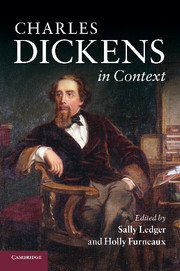Book contents
- Frontmatter
- Contents
- List of illustrations
- Notes on contributors
- Preface
- Notes on references
- PART I LIFE AND AFTERLIFE
- PART II SOCIAL AND CULTURAL CONTEXTS
- 12 Popular culture
- 13 The rise of celebrity culture
- 14 The newspaper and periodical market
- 15 Authorship and the professional writer
- 16 The theatre
- 17 Melodrama
- 18 The Bildungsroman
- 19 Visual culture
- 20 The historical novel
- 21 The illustrated novel
- 22 Christmas
- 23 Childhood
- 24 Work
- 25 Europe
- 26 The Victorians and America
- 27 Educating the Victorians
- 28 London
- 29 Politics
- 30 Political economy
- 31 The aristocracy
- 32 The middle classes
- 33 Urban migration and mobility
- 34 Financial markets and the banking system
- 35 Empires and colonies
- 36 Race
- 37 Crime
- 38 The law
- 39 Religion
- 40 Science
- 41 Transport
- 42 Illness, disease and social hygiene
- 43 Domesticity
- 44 Sexuality
- 45 Gender identities
- Further reading
- Index
30 - Political economy
Published online by Cambridge University Press: 05 August 2012
- Frontmatter
- Contents
- List of illustrations
- Notes on contributors
- Preface
- Notes on references
- PART I LIFE AND AFTERLIFE
- PART II SOCIAL AND CULTURAL CONTEXTS
- 12 Popular culture
- 13 The rise of celebrity culture
- 14 The newspaper and periodical market
- 15 Authorship and the professional writer
- 16 The theatre
- 17 Melodrama
- 18 The Bildungsroman
- 19 Visual culture
- 20 The historical novel
- 21 The illustrated novel
- 22 Christmas
- 23 Childhood
- 24 Work
- 25 Europe
- 26 The Victorians and America
- 27 Educating the Victorians
- 28 London
- 29 Politics
- 30 Political economy
- 31 The aristocracy
- 32 The middle classes
- 33 Urban migration and mobility
- 34 Financial markets and the banking system
- 35 Empires and colonies
- 36 Race
- 37 Crime
- 38 The law
- 39 Religion
- 40 Science
- 41 Transport
- 42 Illness, disease and social hygiene
- 43 Domesticity
- 44 Sexuality
- 45 Gender identities
- Further reading
- Index
Summary
‘What connexion? Always the same, in Oliver Twist and Nicholas Nickleby, Bleak House and Great Expectations, Little Dorrit, Our Mutual Friend.’ So writes Franco Moretti, inspired by the moment in Bleak House where the unnamed narrator questions the coherence of the bafflingly complex, disjointed and partial vision of human life which the novel has thus far presented. However, in this novel, as with Dickens's others, it becomes clear as the text progresses that in fact people, places and objects are connected, despite the apparently random way in which they have been thrown together. As many critics have observed, Dickens is concerned in his fiction to reveal some form of relational, coherent system underpinning what seems to be an impossibly complex and unrelated series of characters, events and situations. This commitment – which can be understood in political as well as aesthetic terms – is significant, because Dickens was writing at a time when the discipline of political economy was making significant declarations about its own power to reveal societal connections.
Keeping the idea of making connections to the fore, this chapter will explore how and why political economy was defined by its practitioners and proponents as a science able to discern systematic coherence beneath the most complicated of social scenarios. Such a claim was often couched in terms that celebrated capitalism's capacity to forge social unity and promote universal progress. But if this was an authoritative and compelling claim, it was by no means universally accepted.
- Type
- Chapter
- Information
- Charles Dickens in Context , pp. 243 - 251Publisher: Cambridge University PressPrint publication year: 2011



